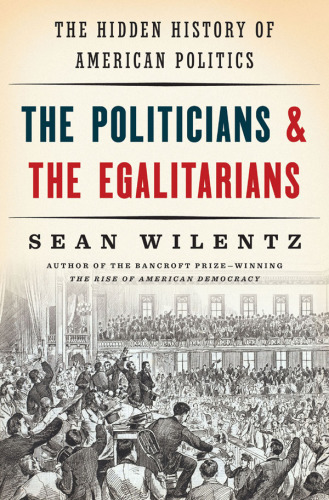
The Politicians and the Egalitarians
The Hidden History of American Politics
کتاب های مرتبط
- اطلاعات
- نقد و بررسی
- دیدگاه کاربران
نقد و بررسی

Starred review from February 8, 2016
Wilentz, author of the Bancroft Prize–winning Rise of American Democracy and professor of history at Princeton University, once again proves himself to be among America’s most skilled (and pugilistic) historians with this brisk, hard-hitting book. He tries, with some success, to rescue liberalism from its detractors on the left and right by arguing that, at its best, liberalism has succeeded through pragmatic, principled politics as well as ideals. Wilentz also convincingly argues that efforts to reduce economic and other inequalities have been a constant in the nation’s history. (It should be noted that he doesn’t stress that counterefforts have also been a constant.) He makes his case principally by taking up other historians’ work about major historical figures: Thomas Paine, Thomas Jefferson, John Quincy Adams, John Brown, Abraham Lincoln, W.E.B. Dubois, Theodore Roosevelt, and Lyndon B. Johnson chief among them. Sometimes Wilentz praises their work, but he’s at his energetic best when on the attack against detractors of his foregrounded great men, and he doesn’t hesitate to describe some histories as “nonsense” and “junk.” In other hands, this would seem silly and lacking force; in Wilentz’s, it’s authoritative and telling. The result is wonderfully readable and the best kind of serious, sharp argumentation from one of the leading historians of the United States.

Starred review from February 1, 2016
A stern, thoroughly satisfying harangue on the realities of politics in the United States by the veteran, prizewinning historian. Wilentz (American History/Princeton Univ.; Bob Dylan in America, 2010, etc.) emphasizes that two key factors of politics, ignored by lesser historians, are essential. The first--sure to jolt even educated readers--is that partisanship and party politics are essential to effective government. The Founding Fathers deplored it, and today's presidential candidates assure us that they detest career politicians. Reformers denounce them, and Americans "want government conducted in a lofty manner, without adversarial confrontation and chaos. But more than two hundred years of antipartisanship has produced nothing," writes the author. "This is because, despite their intentions, the framers built a political system which inspired partisan politics." The second factor--less controversial but no less surprising--is that Americans hate economic privilege. Everyone agrees that vast material inequality threatens democracy. The author argues that the fight for racial and sexual equality during the 1960s and '70s made that period an anomaly, and the conservative swing begun by President Ronald Reagan obscured it, but it returned with a vengeance after the economic crash of 2008. Conservatives today place less emphasis on moral arguments for a free market in favor of claiming that cutting taxes and government will provide jobs and eliminate poverty. Never shy about scolding colleagues, Wilentz maintains that the vogue of denigrating Thomas Jefferson has gone overboard, but he joins in the revival of the reputations of Thomas Paine and Lyndon Johnson. The author deplores the current fashion for giving idealistic outsiders credit for forcing crass politicians to do the right thing. Abolitionists did not compel Abraham Lincoln to promote emancipation, and Johnson supported civil rights long before he took office. A master scholar delivers a delightfully stimulating historical polemic.
COPYRIGHT(2016) Kirkus Reviews, ALL RIGHTS RESERVED.

May 15, 2016
Wilentz (George Henry Davis 1886 Professor of American History, Princeton Univ.), author of the Bancroft Prize-winning The Rise of American Democracy, a definitive sweeping political history of the antebellum period, here argues that economic and social equality are goals that have defined American political discourse since the country's founding. More so than ideological homogeneity, political partisanship and its trials have been and are still essential components for achieving those aims. All the personages covered in this book were embedded in an age in which partisanship was the temper of the times, and simultaneously iconic symbols of egalitarianism: for instance, Thomas Paine's entreaties to American independence, John Quincy Adams and antislavery in the antebellum period, and the Homestead Strike and organized labor. Each chapter is essentially a book review or two in context, including an evaluation of Michael Kazin's American Dreamers, of which the author is especially critical, and which could be read in conjunction with this volume. VERDICT Wilentz's examples support well the thesis of an egalitarian tradition rooted in the dynamic of partisan politics from Thomas Jefferson to Lyndon B. Johnson and up to the present. Recommended. [See Prepub Alert, 12/14/15.]--Jeffrey J. Dickens, Southern Connecticut State Univ. Libs., New Haven
Copyright 2016 Library Journal, LLC Used with permission.

January 1, 2016
Author of the Bancroft Prize-winning The Rise of American Democracy, Wilentz takes the long view on our parlous political climate. He argues that partisanship has always been with us, ultimately yielding social reform, and that our strong egalitarian streak is here to stay.
Copyright 2016 Library Journal, LLC Used with permission.

























دیدگاه کاربران